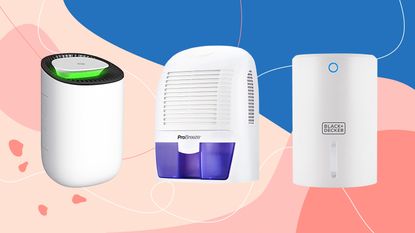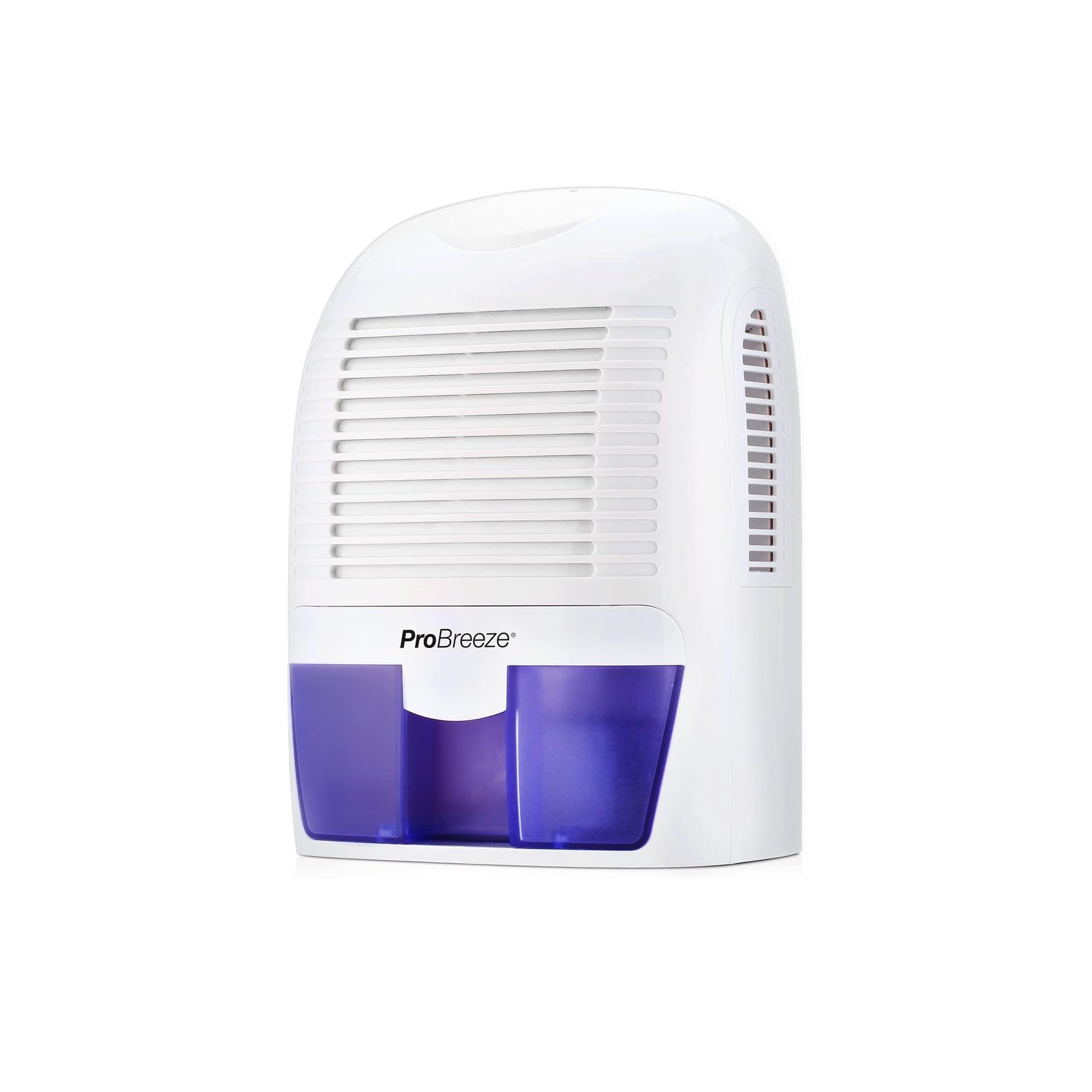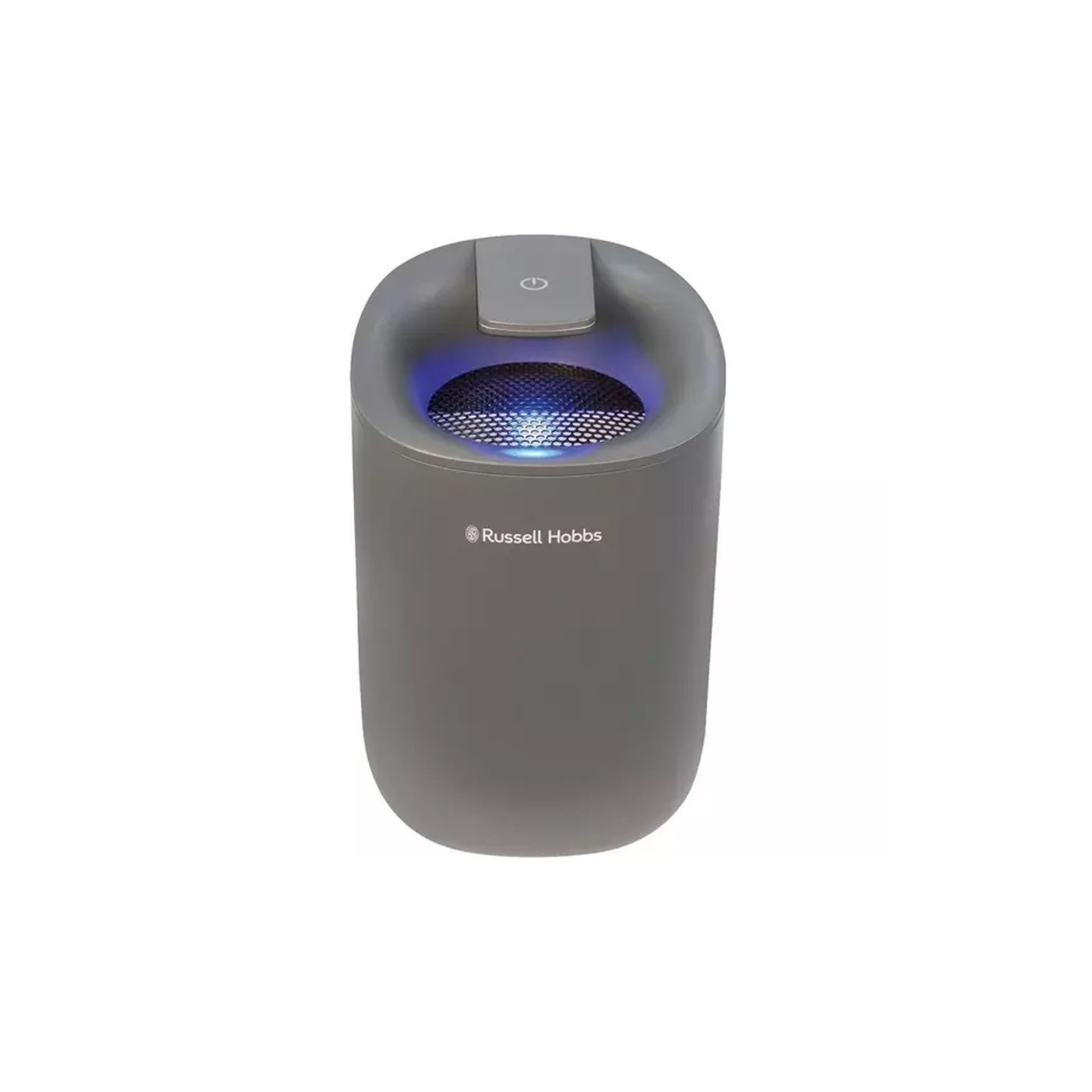Best dehumidifiers under £100 – low cost options to combat damp in the home
We've tried and tested the cheapest dehumidifiers from ProBreeze, Silentnight, Russell Hobbs, and more, to find the low cost dehumidifiers that still get the job done


Sign up to our newsletter for style and decor inspiration, house makeovers, project advice and more.
Thank you for signing up to Ideal Home. You will receive a verification email shortly.
There was a problem. Please refresh the page and try again.
Quick Menu
The quick list
1. Best overall
2. Quietest
3. Cheapest
4. Low energy use
5. Smallest
6. Most stylish
How to choose
FAQs
If you're looking for a low cost dehumidifier, you'll find the best dehumidifiers under £100 in this guide.
We've tried and tested the cheapest dehumidifiers from ProBreeze, Silentnight, Russell Hobbs, Black + Decker, and more, to track down affordable dehumidifiers that do the job without breaking the bank.
That said, the reason these dehumidifiers have small price tags is because they're less powerful than more expensive dehumidifiers on the market, with mositure extraction rates of 0.5L per day and under.
In our tests we found these cheaper dehumidifiers still did a great job of sucking up excess moisture caused by cooking in the kitchen, reducing condensation on windows, and making for a less humid climate in a small space. However, if you want to reduce moisture levels in a space over 15m², or have significant damp and moisture issues to combat, you'll likely need a dehumidifier with a higher extraction rate.
Our guide to the very best dehumidifiers money can buy has our top recommendations for dehumidifiers able to extract between 10L-25L of moisture from the air per day. However, if your damp issues, and your budget, are smaller, you'll find our tried and tested recommendations for the best dehumidifiers under £100 right here.
The quick list
Short on time? This quick list is an overview of the best dehumidifiers under £100. You'll find more information on each low cost dehumidifierand why our testers recommend it if you keep on scrolling.

Best low cost dehumidifier
A low cost dehumidifier comes with a lower extraction rate by default, but the ProBreeze's 0.5L extraction rate is still higher than any other dehumidifier we've found with an RRP under £100, making it capable of reducing moisture in a 15m² area. It's 1.5L water tank is also super generous considering its small build. Easy to use, relatively quiet, and with relatively low energy use we think this is the best dehumidifier for under £100.

Quietest low cost dehumidifier
The Silentnight 39899 600ml Dehumidifier's extraction rate is low at just 0.3L per day and its water tank isn't the largest at 0.6L, but, we found it one of the quietest dehumidifiers we've tested. That makes it a great option if you value peace and quiet, and a good option for the bedroom – especially a kid's bedroom where its green light can double up as a handy night light. It's low energy usage is another plus point, using just 23W of electricity.

Cheapest dehumidifier
At 0.25L, this dehumidifier's extraction rate is half that of our top-rated ProBreeze model, although it's 0.9L water tank is generous considering its super compact build. However, this is one of the cheapest dehumidifiers on the market, and as long as you don't expect it to handle major moisture issues, in our tests it still did a good job of improving the air quality in small rooms of under 8m².

Low energy use
Along with the Russell Hobbs dehumidifier, this Challenge dehumidifier is one of the most compact in our round-up measuring just H22 x W15 x D13cm. Its small size means a low 0.3L per day extraction rate and its water tank is also on the small side with a 0.5L capacity. However, it's energy use is also low, being powered by just 22W of electricity, and its removable dust filter means you can keep it clean and running as efficiently as possible.

Smallest dehumidifier
If you’re looking for a small dehumidifier, then the Russell Hobbs RHDH1061G is about as compact as it gets, measuring just H22 x W14 x D14cm and weighing in at 0.9kg. Its size does mean it lacks power, extracting just 0.3L of moisture per day, and its 0.6L water tank means you'll be emptying it fairly frequently. However, if you want a super compact design, this mini dehumidifier ticks all the boxes.

Most stylish
A 0.45L extraction rate and 1L water tank put this dehumidifier on a par with the best-in-class ProBreeze in terms of performance. However, the CONOPU 1000ml Dehumidifier also offers something extra in the style stakes, with seven multi-coloured lights that activate during operation. Scroll through to find your favourite, leave it to automatically rotate through each colourway, or turn the lights off as you wish. In our tests, it was just let down by noisier operation than the rest of the low cost dehumidifiers in this guide.
Best low cost dehumidifier overall

Specifications
Reasons to buy
Reasons to avoid
Performance This dehumidifier is designed for managing fairly low moisture levels in small rooms up to 15m² or 2200 cubic feet, so it isn't going to cope with major damp issues or be able to control humidity within an entire house like larger capacity dehumidifiers. But, this is the case for pretty much all low cost dehumidifiers, and the ProBreeze's 0.5L extraction rate is still higher than any other dehumidifier we've found with an RRP under £100.
As long as you don't expect too much of it, I was impressed whilst reviewing. I tested the ProBreeze 1500ml Mini dehumidifier in the kitchen and bathroom, the two areas of my home that suffer the most from excess humidity. I left it running overnight in the bedroom and was pleasantly surprised to wake up with no condensation on the windows. Likewise, in the kitchen, the steaming function of my air fryer kicks out a lot of moisture but with the ProBreeze running nothing got steamy.
Although it's the largest size-wise in this low cost dehumidifier round-up, the ProBreeze is still ideal for small spaces. It's compact enough to place on a sideboard, shelving or bedside table. Plus, as air is taken in and pushed back out via outlets on the side, it can sit flush against the wall to save on space. Lightweight with a recessed handle, it's also super portable.
Ease of use This dehumidifier is super easy to operate because there is only one on/off button, although, annoyingly this is situated on the back of the unit which means it can be fiddly to access. Two LED lights will glow green when it’s in operation and red when the water tank is full. A generous 1500ml tank also means you won't constantly be emptying it, whilst the automatic shut off when the tank is full is great for peace of mind.
Noise levels This dehumidifier uses a Peltier condenser that means there's no noisy compressor to disturb you, however, that doesn't make the ProBreeze 1500ml Mini dehumidifier totally silent, there's still the noise of the fan to adjust to. I left it running in my bedroom overnight, and although the 40dBA noise is noticable and initially bothered me, I soon zoned it out. Plus, there’s no varying fan speed which means its white noise is easier to ignore.
Energy use Using just 40W of energy to run, the ProBreeze 1500ml Mini dehumidifier is very cheap to operate. I kept a close eye on my smart meter whilst using it and it didn’t even register, at current energy prices costing less that 1p per hour to run.
Our full ProBreeze 1500ml Mini Dehumidifier review has more detail.
Quietest low cost dehumidifier

2. Silentnight 39899 600ml Dehumidifier
Our expert review:
Specifications
Reasons to buy
Reasons to avoid
Performance: Also capable of reducing moisture in a 15m² space, the Silentnight 39899 600ml Dehumidifier just does so at a slower rate than the ProBreeze 1500ml Mini dehumidifier, extracting 0.3L of water from the air per day in contrast to the ProBreeze's 0.5L.
Water tank capacity is also reduced compared to the ProBreeze's super generous 1.5L tank, with the Silentnight model only able to hold 0.6L of water – which means you'll be emptying the tank a lot more frequently.
I tested the Silentnight 39899 in two key areas of my home, the kitchen and the bedrooms. I found it really made a difference to reducing the condensation around my windows. Plus, the air felt fresher whenever it was running, and it did really well to help eliminate steam and fumes in the kitchen whilst cooking.
Ease of use: Similar to the ProBreeze 1500ml Mini dehumidifier, the Silentnight model is super simple to use. To operate it there’s just one on/off button, which is placed on top of the unit. Its low price point reflects its basic functionality; there are no humidity settings or differing fan speeds, this affordable dehumidifier runs at just one constant single speed.
When the dehumidifier is in operation, a green light tells you it's on, this light turns orange when the tank is full and the dehumidifier will automatically shut off when tank capacity is reached.
Noise levels: This is where the Silentnight 39899 really comes into its own. When switched on, its operating noise levels are just 25dBA, and when I say it’s whisper quiet, I mean it. I couldn't hear this dehumidifier whilst it was running at all. That makes it perfect for anywhere you want to maintain peace and quiet, and thanks to its green light, I thought it made the perfect addition to a kids bedroom, doubling up as a nightlight when its running.
Energy use: The Silentnight 39899 600ml dehumidifier also scores highly on energy efficiency. Although, as with the ProBreeze 1500ml, it's a shame there aren't any automatic humidity sensors so that the dehumidifier only switches on when it's needed (the MeacoDry Arete One Dehumidifier is our top recommendation in this respect), despite the fact it has to be left running, energy use is still relatively low thanks to its 23W energy use. That means it doesn't even cost 1p per hour to have running.
Cheapest dehumidifier


3. Black+Decker 900ml Portable Mini Dehumidifier
Our expert review:
Specifications
Reasons to buy
Reasons to avoid
Performance: At 0.25L, this dehumidifier's extraction rate is half that of our top-rated ProBreeze model, although it's 0.9L water tank is generous considering its super compact build. However, with a recommended retail price of well under £50, this is one of the cheapest dehumidifiers on the market, and as long as you don't expect it to handle major moisture issues, in our tests it still did a good job of improving the air quality in small rooms of under 8m².
Ease of use: At this price point – just like the other low cost dehumidifiers in this round-up – functionality is basic, with the Black+Decker Mini Dehumidifier either on or off. However, unlike some on this list, its power button is really well placed right at the front of the unit, although its water tank is a bit more of a faff, being accessed from the rear of the unit.
The main downside of its design is the placement of the power cord, which sticks out from the side the dehumidifier and rather ruins its aesthetic. It's a shame this wasn't located at the back of the dehumidfier, but the water tank takes up that real estate. However, this mini dehumidifier is super compact and sits neatly on any surface.
Noise levels: When it comes to noise, I could barely hear the Black+Decker Mini Dehumidifier running, even though the official specifications say it generates 30dB of noise. I left it running overnight in my bedroom, and it didn’t disturb me one bit.
Energy use: Just like the Challenge 0.5 Litre Mini Dehumidifier and Silentnight 39899 600ml Dehumidifier, the Black+Decker Mini Dehumidifier's energy use is low, with just 22.5W required for operation.
Low energy use

4. Challenge 0.5 Litre Mini Dehumidifier
Our expert review:
Specifications
Reasons to buy
Reasons to avoid
Performance: Along with the Russell Hobbs dehumidifier, this Challenge dehumidifier is one of the most compact in our round-up measuring just H22 x W15 x D13cm. That makes it hugely portable, although its small size does means a low 0.3L per day extraction rate (about the size of a large glass of wine) and its water tank is also small with a 0.5L capacity.
However, I tested the Challenge 0.5 Litre Mini Dehumidifier several times in my kitchen whilst cooking and found it collected excess moisture caused by steamy conditions efficiently.
Ease of use: Operation is simple with just one on/off button and two LED lights that will let you know that it’s in operation and alert you when the water tank is full. It also has auto shut-off when the tank capacity is reached.
Emptying the water tank is also easy thanks to a user-friendly design that means you simply pull the tank out from the front of the machine. Then there’s a special water drain bung which you can lift up to effortlessly pour the water away.
Noise levels: Along with the Silentnight 39899 I found this one of the quietest low cost dehumidifiers in this round up. It produces 35dB of noise whilst operating, but I didn't really hear it running at all. A couple of times, I even had to lean in to make sure it was actually switched on!
Energy use: The Challenge 0.5 Litre Mini Dehumidifier's low energy use is impressive, using just 22W of energy to power its operation. Along with the Silentnight 39899 and Black+Decker Mini Dehumidifier (which use 23W and 22.5W respectively) this makes it one of the most lowest cost dehumidifiers to switch on, with running costs of well under 1p per hour at current energy prices. Even better, the Challenge offers a removeable dust filter. Only the CONOPU also offers this benefit, and it means you can easily keep the air filter clean, making for even more efficient running.
Smallest dehumidifier


Specifications
Reasons to buy
Reasons to avoid
Performance: If you’re looking for a small dehumidifier, then the Russell Hobbs RHDH1061G is about as compact as it gets, measuring just H22 x W14 x D14cm and weighing in at 0.9kg. However, despite it being small, it still feels robust and well made.
Its small size does mean it lacks power though, with the RHDH1061G only able to extract 0.3L of moisture per day, and its 0.6L water tank means you'll be emptying it fairly frequently. I tested it out in a few different areas of my home and it didn’t do great in spaces where there was sudden excess of moisture, such as the kitchen during cooking. Whilst it did remove some moisture as I was boiling pans, it didn’t work quick enough to keep moisture completely at bay so there was some condensation build-up on the windows. However, in less intense conditions, it did manage to improve general humidity levels, making the air in rooms under 15m2 feel fresher.
Ease of use: Like all of the low cost dehumidifiers on our list, functionality is basic, but that does make operation hassle-free. There is just one on/off button which you’ll find at the top of the dehumidifier. When it’s in operation a blue LED light will light up so you know it’s working.
Emptying the dehumidifier is easy enough. The water tank pulls out from the back of the machine, but you do need to remove the lid to empty it. This can be a little tricky to remove, especially when it’s full, so just make sure you do it over the sink rather than by any electronics to make sure you don’t spill any water.
Noise levels: The official specifications say that this dehumidifier is 37dBA but I barely heard it. I didn’t even realise it was on when I was in the room. It runs so quietly, you occasionally hear the odd drip as the water hits the already collected water in the tray but that’s about it. It’s ideal for use when you’re working or overnight as it won’t disturb the peace.
Energy use: The one thing that sets this mini dehumidifier apart from its competition is its energy use. At 100W, this compact dehumidifier uses double the energy of the other low cost dehumidifiers in our round-up.
Read our full Russell Hobbs RHDH1061G Portable Dehumidifier review for more detail.
Most stylish low cost dehumidifier

6. CONOPU 1000ml Dehumidifier
Specifications
Reasons to buy
Reasons to avoid
Performance: The CONOPU 1000ml Dehumidifier can extract 0.45L of moisture from the air per day, and has a 1L water tank. This makes it almost the most powerful dehumidifier under £100 in our round-up, just being pipped to the post by the ProBreeze 1500ml Mini dehumidifier with its 0.5L extraction rate and 1.5L water tank.
Still, the CONOPU dehumidifier performed well during testing. I used it mostly in the kitchen to try to eliminate build up of condensation when I was cooking, and it worked really well at removing some of the excess moisture. In the bedroom, it got rid of some of the morning condensation but I have quite a large room so it struggled to keep up, and unfortunately its noise levels meant I opted not to leave it running all night long. More on that below.
Ease of use: This is a simple dehumidifier to use as there are only two buttons; one on/off switch and another that operates its multi-coloured lights. Its the light function that really sets the CONOPU apart from its competitors. The light comes on automatically when the dehumdifier is switched on, and as default it cycles through seven different colours. If you’d prefer a static colour, just wait for your favourite one to appear and press the light switch again to hold that colour. If you want to turn the light off, you just tap the light button twice. It's a nice feature, and makes this dehumdifier feel that bit more fun to have running.
Noise levels: Sadly noise levels are what lets this mini dehumidifier down. The brand measures them as 39dB, the loudest of all the low cost dehumidifiers in our round-up. And, for such a small unit, it does make a lot of noise. I found I couldn’t leave it on overnight because it irritated me, which is a shame as its light feature means it would otherwise have proved itself a good nightlight.
Energy use: The CONOPU uses 40W of energy, which is on a par with the ProBreeze dehumidifier, and relatively low in the grand scheme of things, costing around 1p per hour to run at current energy prices.
How to choose the best dehumidifier under £100
If you're shopping for the best dehumidifier under £100, then the first thing to understand is that you're unlikely to find a dehumidifier that's suitable for use in large areas, or that can handle high moisture levels.
Generally speaking, most homes benefit from a dehumidifier that can extract at least 10L of moisture from the air per day, and if you're shopping for the cheapest dehumidifiers on the market then extraction rates are usually far lower than that. For example, the best dehumidifier under £100 in our round-up, the ProBreeze 1500ml Mini Dehumidifier, has an extraction rate of just 0.5L per day.
However, these smaller and cheaper dehumidifiers can still be good for keeping on top of low levels of excess moisture within the home.
Next up, you'll want to consider water tank capacity. The best dehumidifier under £100, the ProBreeze 1500ml Mini Dehumidifier, has a water tank capacity of 1.5L, which is surprisingly generous for its relatively compact build. Most of the other dehumidifiers under £100 have far smaller water tanks of around the 0.6L mark, which is fine, but just means you'll be emptying them more frequently.
Then there's noise levels to consider, although as most of cheap dehumidifiers use Peltier condensers noise levels are already lower than more powerful compressor dehumidifiers. All dehumidifier's should give their operating volumes (measured in dB) in the specifications.
And lastly, there's energy use to consider. Although you might be tempted to buy the cheapest dehumidifier you can find, it's worth considering its energy use too, as a cheap dehumidifier with high running costs won't be as good value as it might appear. 40W seems to be the average for a low cost Peltier dehumidifier, although several options in our round up come in even lower, requiring just 22-23W of energy which means running costs are well under 1p per hour at current energy prices.
FAQs
Are cheap dehumidifiers worth it?
If you don't have too large of a damp problem, or only have a small area where you want to reduce humidity, then a cheap dehumidifier can be worth it.
The main downside of a low cost dehumidifier is that the low price tag reflects a low extraction rate, which means they don't have the power to remove that much moisture from the air.
As with most things, you tend to get what you pay for, and although a cheap dehumidifier for under £100 can help to reduce moisture levels in the home, you're going to get a more powerful dehumidifier and better moisture control by spending over £100.
How much is the cheapest dehumidifier?
The cheapest dehumidifier we’ve recommended is the Black+Decker 900ml Mini Dehumidifier. This is currently priced well under £50 which is incredible value, but it is only capable of removing up to 250ml of excess moisture from the air. That’s ideal for areas that don’t suffer from too much humidity, but you’re unlikely to enjoy benefits such as aiding in laundry drying or dealing with serious damp spots with this machine.
The best dehumidifier under £100 is, in our opinion, the ProBreeze 1500ml Mini Dehumidifier. This is currently priced at well under £100 and does a really good job for such a small machine. It will remove up to 500ml of excess mositre daily and features a large 1500ml water tank so you won’t constantly run to empty the tank.
However, if you're able to extend your budget a little then it’s well worth looking at the Meaco Arete One Dehumidifier. This is more of an ivestment, but is our top-rated dehumidifier overall. Plus, it's quiet, easy to use, works superbly and is very energy-efficient compared to other compressor models. Its Smart Laundry Mode also makes it one of the best dehumidifiers for drying washing indoors. There are 10, 12, 20 and 25L models available, and, all offer a built-in air purifier that means they improve indoor air quality in more ways than one. You can get the full details in our MeacoDry Arete One Dehumidifier review.
How we tested
You'll find full details of the Ideal Home review process on our how we test page.
Our team of reviewers tested a host of the bestselling low cost dehumidifiers to compile this guide.

We compared performance indicators such as moisture extraction rate, tank capacity and how often each model needed emptying, ease of use of controls, aesthetics, and, of course, the price point to find the best value dehumidifiers. We also considered the size and weight of each appliance to find the most portable options, plus each model's noise levels.
Get the Ideal Home Newsletter
Sign up to our newsletter for style and decor inspiration, house makeovers, project advice and more.
- Amy LockwoodDecor Editor
-
 Aldi reveals it's opening 12 new stores in time for Christmas – is your city on the list?
Aldi reveals it's opening 12 new stores in time for Christmas – is your city on the list?Is your city on the list?
By Jullia Joson
-
 36 cosy living room ideas to create the ultimate snuggle-down spot
36 cosy living room ideas to create the ultimate snuggle-down spotAmp up the hygge levels with these cosy styles and expert advice
By Tamara Kelly
-
 How to plant hyacinth bulbs the right way for bright, healthy and beautiful blooms come spring
How to plant hyacinth bulbs the right way for bright, healthy and beautiful blooms come springGardening experts share their step-by-step guide to planting hyacinth bulbs
By Sara Hesikova


